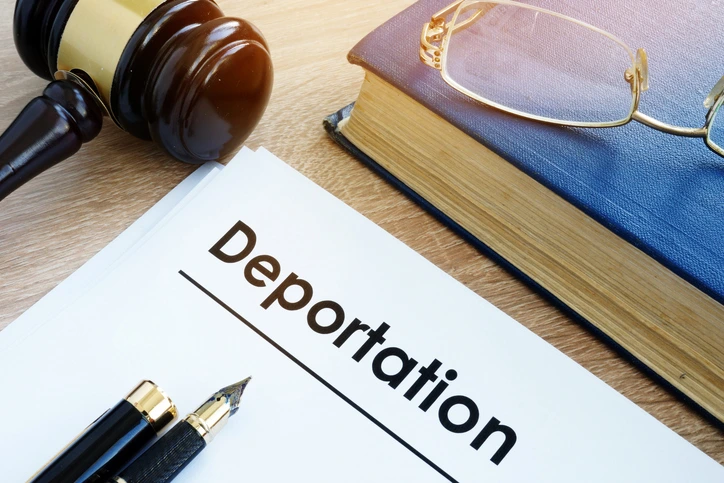Deportation Defense Attorneys in Austin
Proudly Serving Austin & San Antonio’s Immigrant Community
Facing deportation is a complicated, stressful situation for anyone. That’s just one reason it’s so important to find knowledgeable, helpful, bilingual immigration lawyers to step up and represent you in your time of need. Peek Law Group offers experienced counseling and guidance in immigration law.
If you or someone you love may face deportation or removal proceedings, then you should consider seeking an attorney who is knowledgeable in this field. Seeking an immigration attorney is the ideal solution for canceling deportation. An experienced lawyer will help to direct and guide you through all of your options. When an individual is facing deportation, her or his options will immediately become limited. This is why it is necessary that you find an experienced San Antonio & Austin deportation defense attorney who knows how to help you with your cancellation of deportation.
Here at Peek Law Group, our deportation attorneys in Austin will work hard to determine exactly any possible eligibility regarding cancellation of deportation. We will also break the complete procedure down for you and your loved ones in order to make it easier for you. Our Austin deportation lawyers will also help you through all of the filing and paperwork, and aid you in preparation for your application so that you have the best possible chances of winning your deportation case.

To speak with one of our experienced immigration lawyers, contact our offices and we will be more than willing to help. It’s time to stop hesitating.
How To Appeal Deportation: 2 Ways
There are two methods for an immigrant to appeal deportation, by showing that she or he deserves cancellation of deportation using an application for cancellation of deportation.
- The first option is a traditional cancellation of removal/deportation for a non-permanent resident.
- The second choice is cancellation for an abused and non-permanent immigrant.
For more details on these options and what we can do for you, contact Austin deportation attorneys.
Success Stories: Cancellation of Removal
J.M.A. – 12/4/12 – Cancellations of Removal/Deportation – WIN! Client stays with family!
Client is a legal permanent resident who was arrested for a DWI. Client had several prior convictions for burglary of a vehicle and possession of drug paraphernalia. Client has a family in the U.S., including a pregnant wife and two other children from a previous relationship in which he has custody. Our Criminal Defense team was able to help Client plead out his DWI charge, so he was still eligible for Cancellation of Removal. Then Peek Law Group’s immigration team stepped in arguing before the immigration judge that Client’s prior convictions were not sufficient crimes of moral turpitude to preclude Client from relief. The judge agreed and cancelled Client’s removal proceedings allowing him to stay with his family in the U.S.
B.E.S. – 11/8/2012 – Cancellation of Removal/Deportation & Legal Permanent Residency Issued
Client is an undocumented person who was arrested for assault. Client’s wife is a U.S. citizen and his three children are all U.S. citizens. Client’s wife is chronically ill and disabled. Peek Law Group ’s immigration team was able to argue that Client should be able to stay in the U.S. since he was married to a U.S. citizen and had three dependent U.S. citizen children, all of whom would suffer extreme hardship if Client was deported. The judge agreed and Client became a legal permanent resident and won his cancellation of removal hearing.
T. C. O. – 6/30/11 – Cancellation of Removal/Deportation – WON !! Client granted Permanent Residency!
Client had lived here most his life but had some criminal infractions which made him deportable. We argued to the judge the equities he had here in the U.S., and put on evidence and testimony of his good character and value to the community and the Judge sided with us and granted us the victory and awarded our client by cancelling his deportation. Great win that allows a client to avoid being deported to a country which he hasn’t known since he was a baby, that is today a very violent a dangerous place, and more importantly reunifying him with his family and letting them stay together here in the U.S.!
To determine if you may be eligible for great results like these, contact our office. Or you can read more of our client experiences.
Cancellation of Removal for Non-Permanent Residents in Texas
For particular non-permanent residents facing deportation, cancellation of removal may provide a pathway to remain in the United States legally. This discretionary relief allows individuals who meet strict eligibility criteria to avoid deportation and obtain lawful permanent residency.
To qualify for cancellation of removal, an applicant must demonstrate the following:
- Continuous physical presence in the United States for at least 10 years before receiving a Notice to Appear (NTA) in immigration court.
- Proof of good moral character during the qualifying period.
- No disqualifying criminal convictions under INA §§ 212(a)(2), 237(a)(2), or 237(a)(3).
- Evidence that deportation would result in exceptional and extremely unusual hardship to a U.S. citizen or lawful permanent resident spouse, child, or parent.
Cancellation of removal is not automatically granted, even if all conditions are met. The final decision rests with the immigration judge, who evaluates whether the applicant deserves favorable discretion based on the circumstances of their case.
Continuous Physical Presence Requirement
One of the key eligibility criteria for cancellation of removal is proving at least 10 years of continuous physical presence in the United States. This period begins when the individual first enters the country—whether legally or without inspection—and ends when one of the following occurs:
- The individual receives a Notice to Appear (NTA) in removal proceedings.
- A criminal offense is committed that renders the individual inadmissible or removable.
- The individual departs the U.S. for more than 90 consecutive days or 180 days cumulatively.
If any of these events occur before the 10-year mark, the physical presence requirement is considered broken, and the individual may no longer qualify for cancellation of removal.
Establishing Good Moral Character
Applicants must also demonstrate good moral character during the 10 years before their request for relief. While immigration law does not provide an exact definition of good moral character, it does outline behaviors and convictions that automatically disqualify an individual from meeting this requirement.
Individuals barred from proving good moral character include those who:
- Habitually abuse alcohol or drugs.
- Engage in prostitution or commercialized vice.
- Have committed or admitted to a crime involving moral turpitude (CIMT).
- Have multiple criminal convictions resulting in combined sentences of 5 years or more.
- Have been convicted of controlled substance violations, including drug trafficking.
- Have engaged in smuggling or human trafficking.
- Have primary income derived from illegal gambling or have been convicted of two or more gambling-related offenses.
- Have provided false testimony to obtain an immigration benefit.
- Have been incarcerated for 180 days or more in total.
- Have been convicted of an aggravated felony under INA § 101(a)(43).
Certain offenses, such as murder, smuggling of family members, and aggravated felonies, permanently bar the establishment of good moral character. Additionally, individuals ordered removed within the past five years may be ineligible for cancellation of removal.
Criminal Convictions That Disqualify Applicants
Non-citizens convicted of certain offenses under INA §§ 212(a)(2), 237(a)(2), or 237(a)(3) are automatically disqualified from seeking cancellation of removal.
These offenses include:
- Crimes involving moral turpitude (CIMT).
- Controlled substance violations, including possession and trafficking.
- Firearms offenses.
- Prostitution or crimes linked to commercial vice.
- Domestic violence-related offenses.
- Document fraud or falsification of immigration records.
- Failure to register with the government as required by law.
A thorough legal review of any criminal history is crucial before filing for cancellation of removal, as certain convictions can render an applicant permanently ineligible.
Proving Exceptional and Extremely Unusual Hardship
To be granted cancellation of removal, an applicant must demonstrate that their deportation would impose exceptional and extremely unusual hardship on a qualifying relative—a U.S. citizen or lawful permanent resident spouse, child, or parent.
The Board of Immigration Appeals (BIA) has clarified that the hardship must be significantly beyond what is typically expected when a family member is removed from the country. Standard financial hardship or lower living conditions in the applicant’s home country are insufficient.
Instead, factors that may support a strong hardship claim include:
- The age and vulnerability of the qualifying relative, particularly children.
- The applicant’s length of residence in the U.S. and integration into the community.
- The qualifying relative’s medical conditions requiring specialized care available only in the U.S.
- The applicant’s home country’s political, economic, or humanitarian conditions.
- The qualifying relative’s educational opportunities and impact of relocation.
- The applicant’s financial responsibilities and employment.
Ultimately, each case is judged on its merits, and proving hardship requires compelling documentation and legal advocacy.
Why Legal Representation is Crucial for Cancellation of Removal
Cancellation of removal cases are highly complex, requiring strong evidence, thorough documentation, and skilled legal argumentation. The immigration judge has full discretion to approve or deny the request, even if the applicant meets all eligibility requirements.
At Peek Law Group, our experienced Texas immigration attorneys:
- Carefully analyze eligibility based on immigration and criminal history.
- Prepare and file the strongest case, properly documenting all supporting evidence.
- Defend clients in immigration court, arguing persuasively for relief from deportation.
- Assist with appeals and motions to reopen cases when necessary.
If you or your family member is facing removal proceedings, please contact our office to speak with an experienced Austin immigration attorney about your options.
Canceling Deportation For Non-Permanent Abused Immigrants
An immigrant who has been battered or subjected to extreme cruelty into the U.S. by his or her U.S. citizen or lawful permanent resident spouse or parent.
An immigrant who is a parent of a child of a U.S. citizen or lawful permanent resident and the child has been battered or subjected to extreme cruelty under the U.S. by the U.S. citizen or lawful resident parent.
The immigrant maintained continuous physical presence in the U.S. for 3 or more years prior to the Notice to Appear.
- Good Moral Character Requirement
The immigrant has been a person of good moral character.
- No Aggravated Felony Convictions
The immigrant has not been convicted of an aggravated felony.
- Not Inadmissible or Deportable
The immigrant inadmissible under section 212(a)(2) or 212(a)(3) of the INA, and he or she is not deportable under section 237(a)(1)(G) or section 237(a)(2)-(4) of the INA.
- Deserving of Favorable Exercise of Discretion
The immigrant is deserving of favorable exercise of discretion on his or her application.
The immigrant’s removal would result in extreme hardship to him or herself or his or her child who is the child of a U.S. citizen or lawful permanent resident.
The immigrant is a child whose removal would result in extreme hardship to him or herself or his or her parent. For more details on what we can do for you, contact Austin deportation attorneys.
- Battery or Extreme Cruelty
To be eligible for cancellation of removal for a non-permanent abused immigrant, one must show he or she was battered or suffered extreme cruelty or his or her child was batted or suffered extreme cruelty by a U.S. Citizen or lawful permanent resident.
A battery or extreme cruelty includes, but is not limited to:
- Acts of violence.
- Forced detention resulting in physical or mental injury.
- Threats of physical or mental injury.
- Psychological abuse.
- Sexual abuse.
- Extreme Hardship
One of the elements for showing cancellation of removal for a non-permanent abused immigrant is extreme hardship. The age of the applicant, the length of residence in the U.S., family ties in the U.S. and abroad, health of the applicant and qualifying relatives, financial status, occupation of the applicant, ties to the community, economic and political conditions in the native country, immigration history, and the applicant’s position in the community are all factors used to determine extreme hardship.
In determining extreme hardship, the immigration judge may also consider the following:
- Major extent of the physical and psychological consequences of abuse.
- The effect of loss of access to the U.S. courts and criminal justice system including the ability to obtain and enforce a protection order.
- The possibility that the batterer’s friends and family or other connected to the batterer in the home country could physically and psychologically harm the applicant.
- The applicant’s needs, or those of the applicant’s children, for social, medical, mental health, or other supportive services that may be required as a result of the domestic violence and that are unavailable or not accessible in the home country.
- The existence of laws and social practices in the home country that punish the applicant because he or she has been a victim of domestic violence or has taken steps to leave an abusive situation.
- The abuser’s ability to travel to the home country.
- The willingness or ability of the authorities to protect the applicant in the home country.
He or she is not inadmissible under section 212(a)(2) or 212(a)(3) of the INA,
- He or she is not deportable under section 237(a)(1)(G) or section 237(a)(2)-(4) of the INA
Inadmissible Crimes & Deportable Offenses
To qualify for cancellations of removal for a non-permanent abused immigrant, an individual must show he or she has not committed an inadmissible crime or a deportable offense. Inadmissible crimes include crimes of moral turpitude, controlled substance violations, or prostitution.
Deportable offenses include offenses that affect the following types of individuals:
- Those who have been involved in marriage fraud.
- Those convicted of crimes of moral turpitude.
- Those convicted of aggravated felonies.
- Those engaged in high speed flight from immigration checkpoints.
- Those convicted of controlled substance violations.
- Those who are drug abusers and addicts.
- Those convicted of firearm offenses.
- Those convicted of domestic abuse, stalking or child abuse.
- Those who have violated portions of protected orders that were meant to protect against threats of violence or bodily injury.
- Those who are deportable for failing to report to the government.
- Those who are removable for document fraud.
At Peek Law Group, We Also Representing The Following Practice Areas:
How Can a San Antonio & Austin Deportation Defense Attorney Help?
When faced with the difficulties of immigration law, seeking the guidance of a skilled San Antonio and Austin deportation defense attorney is crucial. They can navigate the intricate legal landscape, protecting your rights and offering the best possible defense against deportation. Deportation defense attorneys not only provide legal counsel, but they stand as advocates for immigrants, fighting to keep families together and ensure a fair process for each individual.
The services provided by a deportation defense attorney include:
- Comprehensive Case Evaluation: Every case is unique. Deportation defense attorneys assess your situation in detail to develop a personalized strategy.
- Legal Representation: They offer strong representation in court hearings and immigration proceedings.
- Documentation and Paperwork: These attorneys assist in preparing and submitting necessary legal documents, ensuring accuracy and punctuality.
- Communication with Authorities: They liaise with immigration authorities on your behalf, handling any issues that may arise.
- Appeals: If a case does not result in a favorable outcome initially, deportation defense attorneys can help file appeals and continue the fight for your rights.
- Updates on Immigration Law: As immigration laws can change frequently, having a legal expert can ensure you are up-to-date with any changes that may affect your case.
- Emotional Support: Facing deportation is stressful. An empathetic attorney can provide emotional support alongside legal guidance.
By leveraging their knowledge and expertise, our San Antonio and Austin deportation defense attorneys can help reduce uncertainty and stress, offering the best possible defense to those facing the threat of deportation.
If you or your family member is facing removal proceedings or facing deportation, please contact our office or call (512)-474-4445 to speak with an experienced deportation defense lawyer in Austin & San Antonio about your options.















